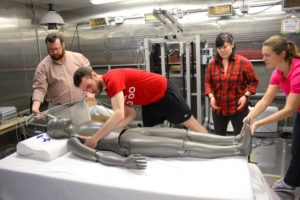A textile engineer is someone who…
- Develops a nano-composite material for deep space exploration
- Integrates a worldwide distribution program, eliminating a company’s reliance on regional stockpiles
- Develops new biocompatible materials for artificial organs, blood vessels, tendons, or ligaments
- Designs a product that grants more independence to those with disabilities
- … wants to make a difference. Is this you?
The Textile Engineering program is an interdisciplinary curriculum drawing on diverse science and engineering principles. Textile Engineering students develop a unique background, which allows them to pursue undergraduate research, summer intern experiences, and design projects ranging from artificial blood vessel development to the design of novel water filtration units for remote villages to structures to protect astronauts from radiation while on the moon. The program offers small class sizes with personal attention from faculty. Compared to the rest of North Carolina State University, the Wilson College of Textiles has the highest percentage of students participating in its scholarship programs.
The TE Curriculum provides a broad base of fundamental engineering courses as a foundation for studies in textile engineering. There are three concentrations in the TE Program:
Information Systems
Whether one is controlling the latest machines or managing a company’s inventory and supply chain, computer information systems make the world go. This concentration provides the student with the use of database information systems and is linked with Industrial Engineering, which allows most students to minor in IE while some choose to minor or double major in Computer Science.
Product Engineering
This concentration focuses on the design of new and innovative products and is the most multi-disciplinary and flexible. Students may concentrate on specific areas of interest including bio-medical materials, sports textiles, and composites. Some students in this concentration choose to double major in Biomedical Engineering while others minor in Material Science.
Chemical Processing
This concentration is designed to combine both Textile and Chemical Engineering to develop chemical process improvement engineers for industries dealing with fibers and polymers.
The Textile Engineering Program is accredited by ABET, and is a joint program between the College of Engineering and Wilson College of Textiles. Textile engineering courses deal with the application of scientific and engineering principles to the design and control of all aspects of fiber, textile, and apparel processes, products, and machinery. These include natural and man-made materials, the interaction of materials with machines, safety and health, energy conservation, and waste and pollution control. Additionally, students are given experience in plant design and layout, machine and wet process design and improvement, and designing and creating textile products. Throughout the Textile Engineering curriculum, students take classes from other engineering and disciplines including Mechanical, Chemical, Materials, and Industrial Engineering Departments.
Courses include:
Computer-Based Modeling for Engineers, Textile Lean Six Sigma Quality, Textile Information Systems Design, Polymer Engineering, Polymeric Biomaterials Engineering, Mechanics of Tissues & Implants Requirements, Textile Senior Design, Special Topics, Dynamics of Fabric Production Systems, Textile Composites
Additional Information:
In’s and Out’s of Engineering CODA
Article: A Closer Look at Textile Technology and Textile Engineering
Video-Engineering Majors Exploration
Video-The Creativity of Engineering at NC State
14 Grand Challenges for Engineering
| College |
|
| Discipline |
|
| Academic Department | |
| Departmental Contact |
|
| Major Overview | |
| Plan Requirements | |
| Semester Sequence | |
| Related Majors | |
| Minors |
|
| Skills You Could Develop |
|
| Learn More About This Major | |
| Career Titles | |
| Learn More About Careers |
